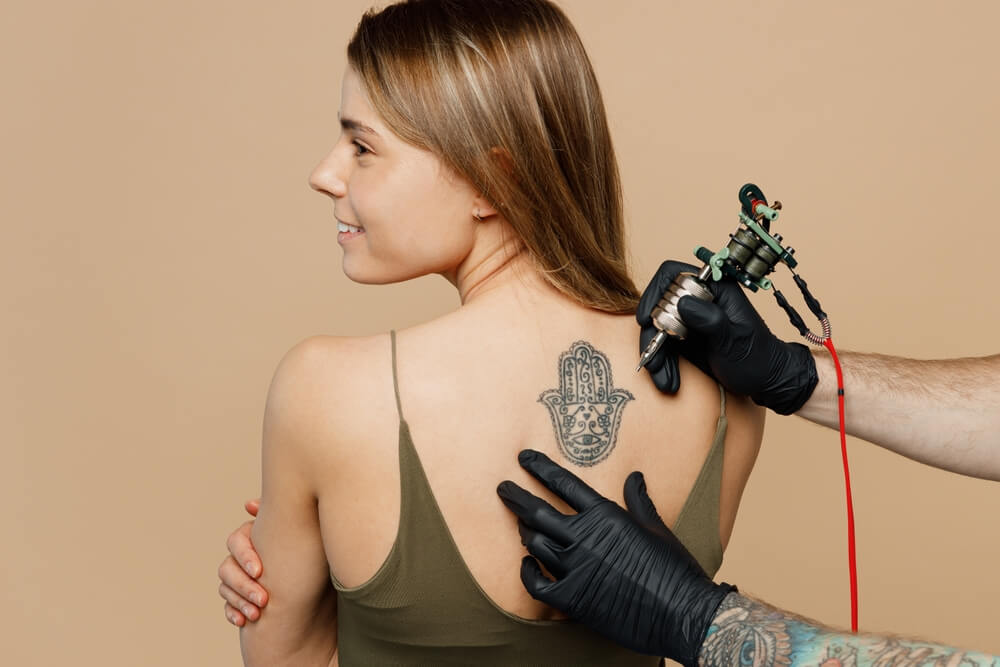How Old Does a Teen Have to Be to Get a Tattoo? Guide for Parents

The question, “How old do you have to be to get a tattoo?” is one that comes up often in families with teenagers.
Because let’s face it: a teen’s desire for a tattoo can create a challenging situation for parents. It brings up very real concerns about laws, health, and whether it is a decision their child might one day regret.
Not sure what steps to take, or how to make that final call? This guide will provide parents with a clear look at the complexities surrounding tattoos for minors.
Contents:
- Legal Age for Tattoos: A Global and Local Look
- Health and Safety Considerations
- The Emotional and Ethical Side of Teen Tattoos
- Alternatives to Tattoos for Teens
- How Parents Can Stay Informed and Supportive
- FAQs
Legal Age for Tattoos: A Global and Local Look

natatravel/Shutterstock
The legal age to get a tattoo varies significantly around the world and even within countries. What is permitted in one state or country might be strictly forbidden in another, even with parental consent. Understanding these regulations is the first step for any parent.
Most laws are in place to protect minors from making permanent decisions they are not mature enough to handle and from potential health risks associated with the tattooing process. The legal tattoo age is a key piece of these protections.
How Old Do You Have to Be to Get a Tattoo in the US
In the United States, there is no single federal law governing tattoos. Instead, each state sets its own regulations. This creates a patchwork of rules across the country. In most states, the minimum age to get a tattoo is 18.
However, many states have provisions for minors to get a tattoo with parental consent. This is where it gets complicated. Parental consent often means a parent or legal guardian must be present during the procedure and provide written permission. Both the minor and the parent will likely need to show a government-issued photo ID.
Here are some examples of different state laws governing how old you need to be to get a tattoo:
- States Prohibiting Tattoos on Minors: Some states, like Alaska and California, have a strict ban on tattooing anyone under the age of 18, regardless of parental consent. These laws treat tattooing a minor as a crime.
- States Allowing Tattoos with Parental Consent: Many states, including Illinois and Ohio, permit tattooing on minors with explicit consent from a parent or legal guardian. The guardian typically must be present.
- States with Ambiguous or No Specific Laws: A few states might have less specific laws, often defaulting to local county or city health department regulations.
As a parent, it’s important that you always check the specific state laws and local ordinances where you and your child live. Calling a reputable tattoo parlor or the local health department can provide some much-needed clarity in many cases.
Legal Age to Get a Tattoo in the UK
The laws in the United Kingdom are much more straightforward than in the US. The Tattooing of Minors Act 1969 makes it illegal to tattoo anyone under the age of 18 unless it is for medical reasons.
This law applies to England, Wales, and Scotland. There are no exceptions for parental consent. Any tattoo artist who tattoos a minor can face prosecution and a fine. This clear-cut rule removes any ambiguity for parents and teens in the UK.
Tattoo Regulations in Other Countries
Globally, the tattoo age varies widely.
- Canada and Australia: Similar to the US, laws are set at the provincial or territory level. Most areas set the minimum age at 18, with some allowing for parental consent for those aged 16 or 17.
- European Union: Many EU countries, such as France, Germany, and Spain, allow tattoos for minors aged 16 or 17 with parental consent. However, countries like Denmark have stricter rules, banning tattoos on the hands, neck, and face.
At what age can you get a tattoo? As you can see, it clearly depends entirely on your location. Researching local laws is non-negotiable.
Health and Safety Considerations

Yulai Studio/Shutterstock
Beyond the legal questions, the health and safety of the child are paramount. The process of tattooing involves breaking the skin with needles, which carries inherent risks.
Potential Health Risks
A professional and sterile environment minimizes risks, but parents should be aware of the potential complications:
- Infection: Unsterilized needles or equipment can transmit serious blood-borne diseases like Hepatitis B, Hepatitis C, and HIV. Skin infections, such as staph, are also a risk if the tattoo is not cared for properly during healing.
- Allergic Reactions: Some people can have allergic reactions to the inks used in tattoos. This can cause rashes, severe itching, or bumps on the skin days or even years after getting the tattoo. Red, green, yellow, and blue inks are common culprits.
- Keloids and Scarring: The tattooing process can sometimes lead to the formation of keloids, which are overgrown areas of scar tissue. This is more common in individuals who are prone to them.
- MRI Complications: Although rare, some people with tattoos have reported swelling or burning in the tattooed area during magnetic resonance imaging (MRI) exams.
Safety First: Choosing a Reputable Studio
If a family decides to proceed with a tattoo for a minor where it is legal, choosing the right tattoo artist and studio is critical. Safety should be the primary focus.
- Licensing and Certification: Ensure the tattoo parlor and the tattoo artist are licensed by the local health department. Reputable artists will display their licenses prominently.
- Cleanliness: The studio should be impeccably clean. Needles must be new, single-use, and opened in front of the client. The artist should wear disposable gloves.
- Consultation: A good tattoo artist will offer a consultation to discuss the design, placement, and the entire process. They should also be willing to answer any questions about their safety procedures.
- Aftercare Instructions: The artist must provide clear verbal and written instructions on how to care for the new tattoo to prevent infection.
Never consider a “tattoo party” or an unlicensed artist working from their home. The risks of infection and poor-quality work are far too high in these unregulated settings.
The Emotional and Ethical Side of Teen Tattoos

Master1305/Shutterstock
A tattoo is a permanent mark on the body. While a teenager might feel certain about a design today, their feelings could change dramatically in the future.
Maturity, Regret, and Permanent Decisions
The adolescent brain is still developing, particularly the prefrontal cortex, which is responsible for long-term planning and decision-making. This means teens are more prone to impulsive choices that they may later regret.
Translation? A design that feels deeply meaningful at 15 could become a source of embarrassment at 25. While tattoo removal technology has improved, it is expensive, painful, and may not completely remove the ink. As a parent, this is a crucial point for you to discuss with your teens.
Fostering Open Communication
When a teen brings up the topic of a tattoo, it should serve as an opportunity for a conversation, not a conflict. Dismissing their desire out of hand can lead them to seek out unsafe, illegal options.
Parents can use this as a chance to talk about self-expression, identity, and the consequences of permanent choices. Asking questions can help a teen think more deeply about their motivation. Why this design? Why now? What does it represent? At the end of the day, remember that a calm discussion can be much more effective than an outright ban.
Alternatives to Tattoos for Teens

RAMNIKLAL MODI/Shutterstock
For teens eager for body art, there are many temporary and non-permanent ways to express themselves. Suggesting these alternatives can be a great compromise.
- High-Quality Temporary Tattoos: Many companies create realistic and artistic temporary tattoos that can last for a week or more. This allows a teen to “test drive” a design or placement.
- Henna: Henna is a plant-based dye used for body art that stains the skin for a few weeks. It is important to use natural, brown henna, as black henna often contains a chemical called PPD that can cause severe skin reactions and permanent scarring.
- Body Jewelry: Exploring options for a new body piercing, where legally permitted, can sometimes satisfy the desire for body modification. As with tattoos, make sure you go to a professional piercer.
- Art and Fashion: Encouraging a teen to express their identity through their clothing, hairstyle, or by creating art can be a powerful and non-permanent outlet.
How Parents Can Stay Informed and Supportive
Parenting a teenager involves balancing their growing need for independence with the need for safety and guidance. This is especially true when it comes to decisions with lasting consequences like tattoos.
Talking About Body Autonomy
Discussions about tattoos can be part of a larger conversation about body autonomy. This means teaching teens that they have the right to make decisions about their own body, but also that with this right comes responsibility. It is about respecting their desire for self-expression while helping them understand the long-term implications of their choices.
Recognizing Impulsive Behavior
As a parent, you know your child best. Signs of impulsivity, like a sudden and intense desire for something new without much thought, can be a red flag. If a teen’s request for a tattoo seems to come out of nowhere or is tied to peer pressure, it might be wise to encourage them to wait. Suggesting a “cooling-off” period of six months or a year can help them determine if they are truly committed to the idea.
Using Technology to Support Safe Independence
As teens explore their world, parents naturally worry about their safety. Modern technology can offer peace of mind without feeling intrusive. Apps like Findmykids are designed to help parents stay connected.
For instance, if a teen is meeting friends or heading to a part-time job, a parent can check their location to ensure they arrive safely. The app can also send notifications when a child leaves a designated area, like school or home.
This kind of tool is not about spying, but about creating a safety net that supports a teen’s growing independence. It helps parents stay informed, which can reduce anxiety and foster trust.
Stay connected without compromising trust—try Findmykids today and give your teen the freedom to explore safely!
A Decision That Lasts a Lifetime
Ultimately, the decision to get a tattoo is a permanent one. When a minor is involved, the responsibility falls on you, the parent, to navigate the legal, health, and emotional landscape. For most regions, the legal age to get a tattoo is 18, and for good reason.
Encouraging a teen to wait until they are a legal adult is often the wisest path. It gives them time to mature and be truly certain about a choice that will stay with them for life. Open dialogue, exploring alternatives, and setting clear boundaries are the most effective tools a parent has.
FAQs
Can a 14-year-old get a tattoo with parental consent?
In most places around the world, including almost all of the United States, the UK, and Canada, a 14-year-old cannot legally get a tattoo, even with parental consent. Most laws that allow for tattoos on minors with consent set the minimum age at 16. States like California and Illinois prohibit tattooing anyone under 18.
In what country can you get a tattoo at 14?
Finding a country with reputable and legal tattoo parlors that will tattoo a 14-year-old is extremely difficult. While some countries may have lax regulations, it is not a safe or recommended practice. Most developed nations have a minimum tattoo age of 18 or 16 with parental consent.
Can you get a tattoo with a 14-year-old?
Generally, no. The legal and ethical standards in the professional tattoo industry prevent reputable artists from tattooing someone so young. The health risks and the potential for regret are considered too high.
Can a 15-year-old get a tattoo with parental consent?
Similar to a 14-year-old, a 15-year-old will find it nearly impossible to get a legal tattoo. Even in US states that permit tattoos on minors with consent, there is often a minimum age of 16. It is crucial to verify your specific state laws. For instance, can a 16-year-old get a tattoo with parental consent? In some states, yes, but it requires the legal guardian to be present with a valid photo ID.
Cover image: ViDI Studio/Shutterstock
Проверьте электронный ящик




















